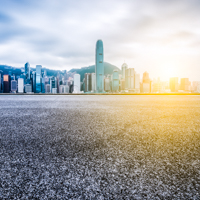.png)
19 July 2017 - Ten years ago, a development strategy for Hong Kong was produced by the Development Bureau and Planning department up to 2030. An update to the planning strategy looking beyond 2040 was coined HK2030+. The vision was for Hong Kong to become “…a livable, competitive and sustainable city, championing sustainable development as the overarching planning goal”.
Ranked as the world’s most unaffordable housing market for seven consecutive years, Hong Kong was classified as “severely unaffordable” by Demographia International Housing Affordability Survey. The current median cost of housing is 18.1 times that of household income. It is estimated that Hong Kong will need one million new residential flats over the next 30 years.
The government for the Hong Kong S.A.R. believes the high property prices are the result of supply-side shortage with severely imbalanced demand. As a consequence, increasing land supply has been part of planning strategy for years. Given the lack of developable land in Hong Kong, methods to increase land for development are being considered.
Despite Hong Kong’s size, considerable efforts have been made to preserve Hong Kong’s natural beauty with a significant portion of land preserved as country parks. However, the significant shortage of housing has made the government reconsider opening the land for development. While not a sustainable long-term solution, it has been suggested to build flats on country park land.
An alternative strategy is land reclamation. The creation of artificial land has been a long-time tactic used to expand usable land in this small and crowded country.
So which option is better to meet the housing shortage? Building an artificial island in the middle of the sea, or developing the remaining precious green spaces?
OKAY.com analyzes country parks and artificial land as solutions to the housing shortage in Hong Kong.
.png)
Developing the preserved Country Parks
While Hong Kong is one of the world’s most densely populated cosmopolitan metropolises, only 25% of land has been developed with only 7% of the land accounting for housing, and around 40% is designated as country parks and nature reserves.
To address the increasingly serious problem of land shortage, Leung Chun-Ying, the former Chief Executive of HKSAR, raised the possibility of opening up some of the country parks for development. Under the proposal, country parks deemed to be of low ecological and sightseeing value in 2015 would be made available for housing development. The recommendation predictably aroused bitter controversy and disputes between Hong Kong lawmakers and conservationists, as it sets a dangerous precedent for the remainder of Hong Kong’s green space.
The government encountered strong opposition regarding the development of the ecological environment from the populace. Additionally, there is the monumental task in regards to the civil engineering of the country’s parks of developable land and the huge cost associated with it. Nonetheless, the former Chief Executive emphasized that country parks protection should take housing needs into account. After his last policy address in January 2017, Leung Chun-Ying asked authorities to launch a study to examine the impact of opening up country parks for residential development. Additionally, the Housing Society has been commissioned to conduct an 18-month study into the feasibility of constructing public flats on two 20-hectare sites near the edges of country parks.
The public continues to have a fierce debate on the topic and a consensus of whether housing needs or environmental protection should be the priority isn’t anywhere near settled. It is still too early to conclude if building residential units in country parks is a viable long-term solution to fix the housing shortage.
Reclaiming Artificial Land
Hong Kong 2030+ blueprint released by the government in October 2016 recommended reclaiming two sections of artificial land – one section off the east coast of Lantau Island, and the other in the northern New Territories – to resolve a land shortfall of 1,200 hectares for housing and business purposes, which is estimated to be capable of housing 1 million residents.
Land reclamation has long been used in Hong Kong to increase land supply. Various infrastructure projects — Hong Kong International Airport — and a number of new towns — Tuen Mun and Sha Tin — were all built on reclaimed land. The city expanded usable land to a total of 67 square kilometers in 2013. The method appears effective, but the bigger question of whether or not it can solve Hong Kong’s housing shortage remains open.
Compared to developing country parks, land reclamation brings “developable” land to the city at a relatively low cost. Nevertheless, the “gift from the sea” is not unlimited and there are plenty of trade-offs, including irreversible environmental damage and coastal erosion.
Compromise on the development of nature reserves appears difficult as they are public assets of value to everyone. Rather than compromising the environment, whether it be country parks or coastal erosion, there are other alternatives the government could consider such as the redevelopment of older areas, converting brownfield sites, or changing the function of underused land.



